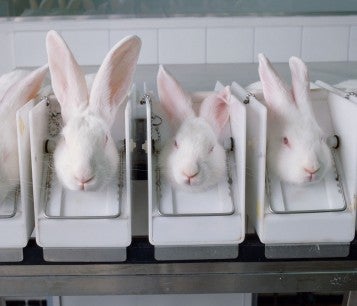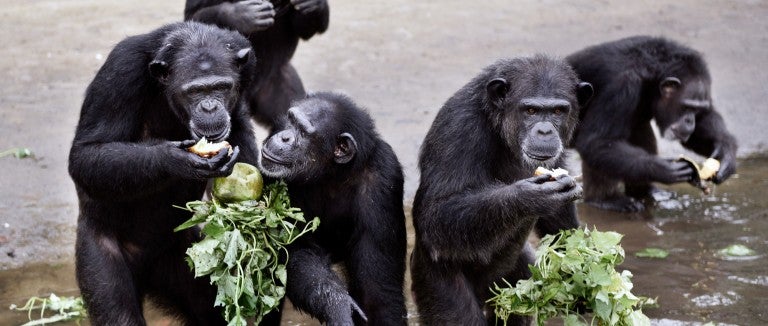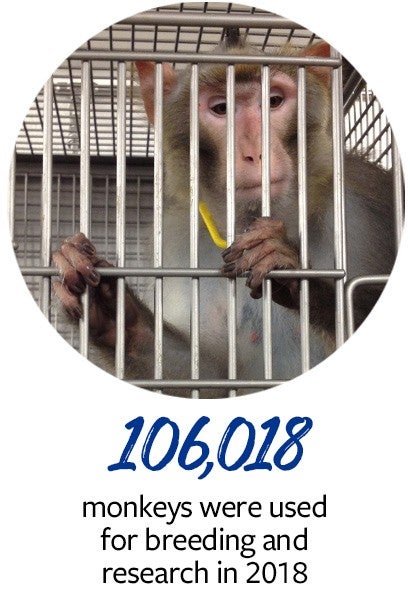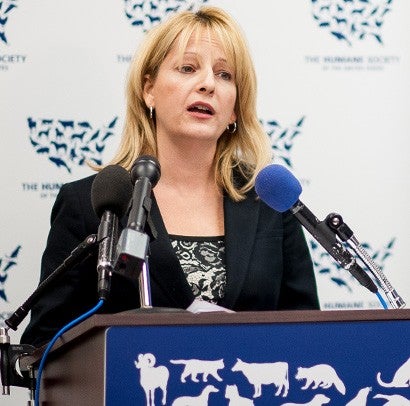You are currently involved with the lifetime care of 65 chimpanzees living at Second Chance Chimpanzee Refuge in Liberia. The HSUS first became involved in this project when former research chimps needed lifelong care after they were phased out of invasive experiments and funding for their care was withdrawn. Can you tell us about your work with that project?
That was an unexpected project that will last far beyond my lifetime. [laughs] We were alerted to these chimpanzees in Liberia and the alarm was sounded at the HSUS. A bunch of people came together and discussed how we were going to feed these chimps who were going to starve. No other groups were stepping up or able to step in like we could, so we made the decision to care for the chimps. We negotiated with the organization that had previously cared for the chimps, and we ended up getting about half the funding needed to pay for their lifetime care. I’m really proud of the HSUS for stepping in. There are many emergency situations across the world, but we really did make a commitment to those chimps. And six years later, here we are. Can’t believe it’s been that long.
What animal research issues are you working on now?
Our priority is ending cosmetics testing on animals in the U.S. and the import of cosmetics tested on animals. All roads lead back to passing federal legislation, the Humane Cosmetics Act. We have industry supporting us, the public supporting us and we just need to get this over the finish line. It will send an important message to the rest of the world, such as other countries that are further behind on this issue, to move forward and move away from this practice. Our goal is to end all harmful animal testing and research, which is a longer-term goal.
We are also focusing on the issue of dog testing because there is a lot of opportunity there: The public is very engaged and scientists are being asked to look more closely at it because of public concern. Of course, we’re not saying, “Don’t use dogs but do use a different animal,” we’re saying, “Don’t use dogs but do invest in non-animal technologies.” These technologies are more effective, efficient and often cost less. We also couple that with getting more government funding for replacing animals altogether.

How can advocates help in the fight to protect research animals?
There are a lot of opportunities. Mainly at the federal level, so reaching out to policymakers when bills like the Humane Cosmetics Act are up for consideration. We also have efforts to get dogs and cats—until we stop their use in research altogether—adopted out after their use in research. It’s ever-changing how people can weigh in, and I would urge people to keep up with the HSUS End Animal Testing Campaign Facebook page to know the latest.
Other ways to get involved:
- Support state legislation that would ban animal cosmetic testing.
- Contact companies to express an interest in cruelty-free products or ask them to support the Humane Cosmetics Act, then sign our Be Cruelty-Free pledge.
- Call on the Department of Veterans Affairs to end certain uses of dogs in research.
Want more content like this?
This was written and produced by the team behind All Animals, our award-winning magazine. Each issue is packed with inspiring stories about how we are changing the world for animals together.
Learn MoreSubscribe



